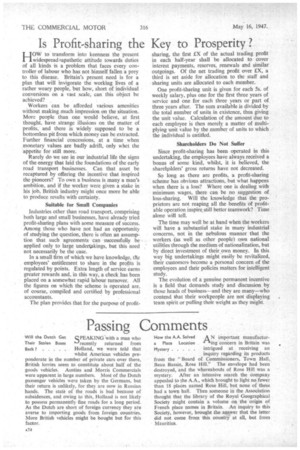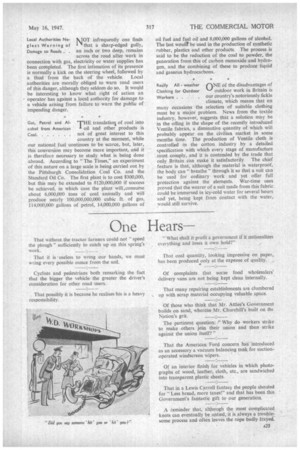Passing Comments
Page 26

Page 27

If you've noticed an error in this article please click here to report it so we can fix it.
Will the Dutch Get qPEAKINGWith a man who Their Stolen Buses "-'recently returned from
Back ? Holland, we were told that
whilst American vehicles preponderate in the number of private cars over there, British lorries seem to constitute about half of the goods vehicles. Austins and Morris Commercials were apparent in large numbers. Most of the Dutch passenger vehicles were taken by the Germans, but their return is unlikely, for they are now in Russian hands. The state of the roads is bad because of subsidences, and owing to this, Holland is not likely to possess permanently fine roads for a long period. As the Dutch are short of foreign currency they are averse to importing goods from foreign countries. More British vehicles might be bought but for this factor. How the A.A. Solved N irnportant manufactur
e Place Location ing concern in Britain was
Mystery intrigued at receiving an inquiry regarding its products from the "Board of Commissioners, Town Hall, Beau Bassin, Rose Hill." The envelope had been destroyed, and the whereabouts of Rose Hill was a mystery. After an intensive search the company appealed to the A.A., which brought to light no fewer than 18 places named Rose Hill, but none of these had a town hall. Then someone in the Association thought that the library of the Royal Geographical Society might contain a volume on the origin of French place names in Britain. An inquiry to this Society, however, brought the answer that the letter did not come from this country at all, but from Mauritius. Local Authorities NeMOT infrequently one finds glect Warning of that a sharp-edged gully, Damage to Roads . . an inch or two deep, remains
across the road after work in connection with gas, electricity or water supplies has been completed. The first intimation of its presence is normally a kick on the steering wheel, followed by a thud from the back of the vehicle. Local authorities are morally obliged to warn road users of this danger, although they seldom do so. It would be interesting to know what right of action an operator has against a ideal authority for damage to a vehicle arising from failure to warn the public of impending danger.
Gas, Petrol and Al
cohol from American 'THE translatiori of coal into I oil and other products is not of great interest to this
Coal
country at the moment, while our national fuel continues to be scarce, but, later, this conversion may become more important, and it is therefoi e necessary to study what is being done abroad. According to "The Times," an experiment of this nature on a large scale is being carried out by the Pittsburgh Consolidation Coal Co. and the Standard Oil Co. The first plant. is to cost $300,000, but this may be extended to $120,000,000 if success be achieved, in which case the plant will.consume about 6,000,000 tons of coal annually and will produce nearly 100,000,000,000 cubic ft. of gas, 114,000,000 gallons of petrol, 14,000,000 gallons of
oil fuel and fuel oil and 8,000,000 gallons of alcohol. The last woull be used in the production of synthetic rubber, plastics and other products. The process is said to be the reduction of the coal to powder, the generation from this of carbon monoxide and hydrogen, and the combining of these to produce liquid and gaseous hydrocarbons.
Really All weather nNE of the disadvantages of Clothing for Outdoor outdoor work in Britain is Workers . . • our country's notoriously fickle climate, which means that on many occasions the selection of suitable clothing must be a major problem. News from the textile industry, however, suggests that a solution may be in the offing in the shape of the recently introduced Ventile fabrics, a diminutive quantity of which will probably appear on the civilian market in some months time. The production of Ventile cloth is controlled in the cotton industry by a detailed specification with which every stage of manufacture must comply, and it is contended by the trade that only Britain can make it satisfactorily. The chief feature is that, although the material is waterproof, the body can " breathe " through it so that a suit can be used for ordinary work and yet offer full • protection against the elements. War-time uses proved that the wearer of a suit made from this fabric could be immersed in icy-cold water for several hours and yet, being kept from contact with the water, would still survive.












































































